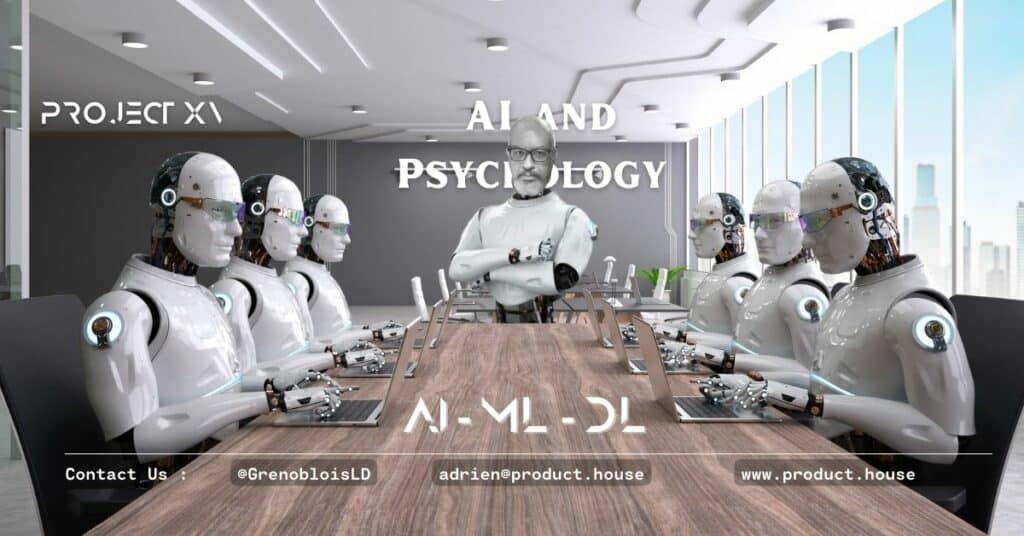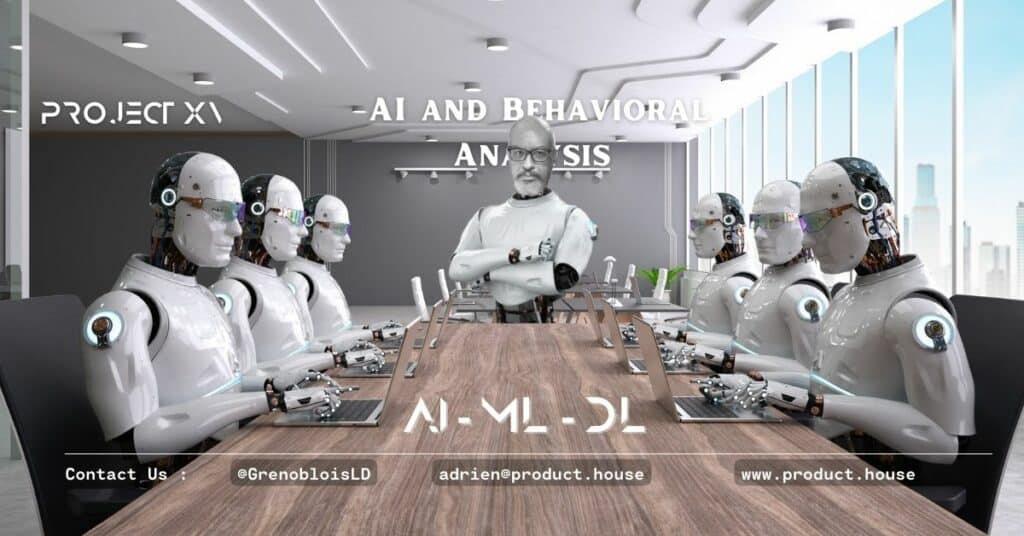AI and Psychology: How Technology Is Improving Mental Health Treatment

Mental health disorders affect millions of people worldwide, yet many individuals do not receive the treatment they need due to various reasons such as lack of access to mental health professionals or stigma associated with seeking help for mental health problems. However, recent advancements in technology have made it possible to provide innovative solutions for improving mental health treatment. One such technology is Artificial Intelligence (AI), which has the potential to revolutionize the field of psychology by improving the accuracy and efficiency of mental health diagnosis and treatment.
In this article, we will discuss the role of AI in mental health treatment, the benefits and challenges of using AI in this field, and the future of AI in psychology.
The Role of AI in Mental Health Treatment
AI is a branch of computer science that deals with creating intelligent machines that can perform tasks that typically require human intelligence, such as visual perception, speech recognition, decision-making, and language translation. In the field of psychology, AI is being used to develop innovative solutions for mental health diagnosis and treatment.
Chatbots
One of the ways AI is being used in mental health treatment is through the development of chatbots. Chatbots are computer programs that simulate conversation with human users, and they can be used to provide mental health support to individuals in need. Chatbots can be programmed to provide psychoeducation, self-help strategies, and crisis intervention. They can also be used to screen individuals for mental health disorders and refer them to mental health professionals for further evaluation and treatment.
Datasets Analysis
Another way AI is being used in mental health treatment is through the analysis of large datasets. AI algorithms can be trained to analyze large datasets of patient information to identify patterns and trends in mental health symptoms and treatment outcomes. This can help mental health professionals develop more personalized and effective treatment plans for their patients.
Virtual Reality
AI is also being used to develop virtual reality (VR) therapy for mental health treatment. VR therapy uses computer-generated environments to simulate real-life situations that trigger anxiety or other mental health symptoms. This can help individuals with mental health disorders to confront their fears in a controlled and safe environment, which can lead to reduced anxiety and improved mental health outcomes.
Benefits of Using AI in Mental Health Treatment
The use of AI in mental health treatment provides several benefits, such as improved accuracy and efficiency of mental health diagnosis and treatment, increased accessibility to mental health support, and reduced stigma associated with seeking help for mental health problems.
AI can help improve the accuracy of mental health diagnosis by analyzing large datasets of patient information and identifying patterns and trends in mental health symptoms and treatment outcomes. This can help mental health professionals develop more personalized and effective treatment plans for their patients.
AI can also help improve the efficiency of mental health treatment by providing mental health support to individuals in need through chatbots. Chatbots can be available 24/7, which can increase accessibility to mental health support for individuals who may not have access to mental health professionals or may not feel comfortable seeking help in person.
The use of AI in mental health treatment can also reduce the stigma associated with seeking help for mental health problems. Chatbots can provide anonymous support, which can make it easier for individuals to seek help without fear of judgment or stigma.
Challenges of Using AI in Mental Health Treatment
Despite the potential benefits of using AI in mental health treatment, there are also several challenges that need to be addressed. One of the challenges is the need for large amounts of data to train AI algorithms. Mental health data is often sensitive, and there are concerns related to data privacy and security. It is important to develop ethical guidelines and protocols for the collection and use of mental health data to ensure that patient privacy is protected.
Another challenge is the need for technical expertise in the field of AI. Mental health professionals may not have the necessary skills to develop and implement AI solutions in their practice. It is important to provide training and support for mental health professionals to ensure that they can effectively integrate AI into their practice.
There are also concerns related to the accountability and transparency of AI algorithms in mental health treatment. It is important to develop standards and regulations for the development and implementation of AI solutions in mental health treatment to ensure that they are safe, effective, and reliable.
Future of AI in Psychology
The future of AI in psychology is promising, and there is great potential for AI to improve the accuracy and efficiency of mental health diagnosis and treatment. AI can also help increase accessibility to mental health support and reduce the stigma associated with seeking help for mental health problems.
However, it is important to address the challenges related to the use of AI in mental health treatment, such as data privacy, technical expertise, and accountability. By developing ethical guidelines, providing training and support, and establishing standards and regulations, we can ensure that AI is used safely and effectively in mental health treatment.
Conclusion
AI has the potential to revolutionize the field of psychology by improving the accuracy and efficiency of mental health diagnosis and treatment. The use of AI in mental health treatment provides several benefits, such as increased accessibility to mental health support and reduced stigma associated with seeking help for mental health problems. However, there are also challenges that need to be addressed, such as data privacy, technical expertise, and accountability. By addressing these challenges, we can ensure that AI is used safely and effectively in mental health treatment, and that individuals with mental health disorders receive the support and treatment they need.
Article Reminders:
- AI is being used in psychology to develop innovative solutions for mental health diagnosis and treatment.
- AI technologies, such as chatbots, large data analysis, and virtual reality therapy, are being used to provide mental health support and improve mental health outcomes.
- Benefits of using AI in mental health treatment include increased accuracy and efficiency of diagnosis and treatment, increased accessibility to mental health support, and reduced stigma associated with seeking help.
- Challenges related to the use of AI in mental health treatment include data privacy and security, technical expertise, and accountability.
- The future of AI in psychology is promising, but ethical guidelines, training and support, and regulations are needed to ensure safe and effective use.
FAQs:
- What is AI in mental health treatment?
AI refers to the use of computer technology to develop innovative solutions for mental health diagnosis and treatment.
- How is AI being used in mental health treatment?
AI is being used in mental health treatment through the development of chatbots, large data analysis, and virtual reality therapy.
- What are the benefits of using AI in mental health treatment?
Benefits of using AI in mental health treatment include increased accuracy and efficiency of diagnosis and treatment, increased accessibility to mental health support, and reduced stigma associated with seeking help.
- What are the challenges of using AI in mental health treatment?
Challenges related to the use of AI in mental health treatment include data privacy and security, technical expertise, and accountability.
- What is the future of AI in psychology?
The future of AI in psychology is promising, but ethical guidelines, training and support, and regulations are needed to ensure safe and effective use.
- What is a chatbot?
A chatbot is a computer program that simulates conversation with human users, and can be used to provide mental health support to individuals in need.
- What is virtual reality therapy?
Virtual reality therapy uses computer-generated environments to simulate real-life situations that trigger anxiety or other mental health symptoms, which can help individuals confront their fears in a controlled and safe environment.
- What are the benefits of using chatbots in mental health treatment?
Chatbots can provide 24/7 mental health support, increase accessibility to mental health support for individuals who may not have access to mental health professionals, and provide anonymous support, which can reduce the stigma associated with seeking help for mental health problems.
- What are the ethical considerations when using AI in mental health treatment?
Ethical considerations when using AI in mental health treatment include data privacy and security, the need for informed consent, the potential for bias, and accountability.
- How can mental health professionals integrate AI into their practice?
Mental health professionals can integrate AI into their practice by receiving training and support, developing partnerships with AI experts, and adhering to ethical guidelines and regulations.
List of Resources:
- National Institute of Mental Health (NIMH): A research organization dedicated to understanding and treating mental illness.
- American Psychological Association (APA): A professional organization for psychologists in the United States, with a focus on promoting mental health and psychological research.
- World Health Organization (WHO): A global organization that provides leadership on public health issues, including mental health.
- Brain & Behavior Research Foundation: A non-profit organization that funds research on mental illness and aims to improve the lives of those affected by mental illness.
- Center for Digital Mental Health: A research center focused on developing and evaluating digital technologies for mental health.
List of Books:
- “Artificial Intelligence and Mental Health” by Adam D. Cobb and Daniel F. Groszkruger: A book that explores the use of AI in mental health diagnosis and treatment.
- “The Future of Mental Health: Deconstructing the Mental Disorder Paradigm” by Eric Maisel: A book that challenges traditional views on mental illness and advocates for a more personalized approach to mental health.
- “Computerized Cognitive Behavioral Therapy for Anxiety and Depression: A Practical Guide” by Stian Solem and Lee M. Ritterband: A guidebook on the use of computerized cognitive behavioral therapy (CCBT) to treat anxiety and depression.
- “The Handbook of Research Methods in Psychology” edited by Harris Cooper and Allen V. M. Wilcox: A comprehensive guide to research methods in psychology.
List of Relevant Experts:
- Dr. Thomas Insel, former director of the National Institute of Mental Health (NIMH): A leader in mental health research and advocacy, with a focus on the role of technology in mental health.
- Dr. Tomer Levin, founder and CEO of Happify Health: A digital health expert with a focus on developing evidence-based mental health interventions.
- Dr. Joshua Gordon, current director of NIMH: A psychiatrist and neuroscientist who has conducted research on the neural circuits underlying mental illness.
- Dr. John Torous, director of the digital psychiatry division at Beth Israel Deaconess Medical Center: A leader in the field of digital psychiatry, with a focus on developing and evaluating digital mental health interventions.
List of Potential Case Studies:
- Use of chatbots to provide mental health support for college students: A case study on the use of chatbots to provide mental health support and counseling to college students, who often face high levels of stress and mental health challenges.
- Use of virtual reality therapy to treat post-traumatic stress disorder in veterans: A case study on the use of virtual reality therapy to treat PTSD in veterans, who often struggle with the psychological effects of combat and trauma.
- Use of large data analysis to identify risk factors for suicide: A case study on the use of large data analysis to identify patterns and risk factors for suicide, with the goal of developing more effective suicide prevention interventions.
List of Examples of Use:
- Chatbots providing 24/7 mental health support and crisis intervention: Chatbots can provide immediate and accessible mental health support, including crisis intervention and emotional support.
- Large data analysis used to identify patterns and risk factors for mental health disorders: Large data analysis can help identify patterns and risk factors for mental health disorders, which can inform the development of more effective treatments and prevention strategies.
- Virtual reality therapy used to simulate real-life situations and provide exposure therapy: Virtual reality therapy can simulate real-life situations and environments, which can be used to provide exposure therapy and help patients overcome anxiety and phobias.
Glossary of Main Technical Terms:
- AI: Artificial Intelligence
- Chatbot: A computer program that simulates conversation with human users
- Virtual Reality Therapy: Therapy that uses computer-generated environments to simulate real-life situations
- Data Privacy: The protection of personal and sensitive data from unauthorized access or use
- Technical Expertise: Knowledge and skills related to the use and development of technology
- Accountability: The responsibility of ensuring safe and effective use of technology
Quiz Questions:
- What is AI in mental health treatment?
- What are some examples of AI technologies used in mental health treatment?
- What are the benefits of using chatbots in mental health treatment?
- What are the challenges of using AI in mental health treatment?
- Who are some relevant experts in the field of AI and psychology?
- What is virtual reality therapy?
- What are some potential case studies for the use of AI in mental health treatment?
- What is data privacy?
- How can mental health professionals integrate AI into their practice?
- Why is accountability important when using AI in mental health treatment?






